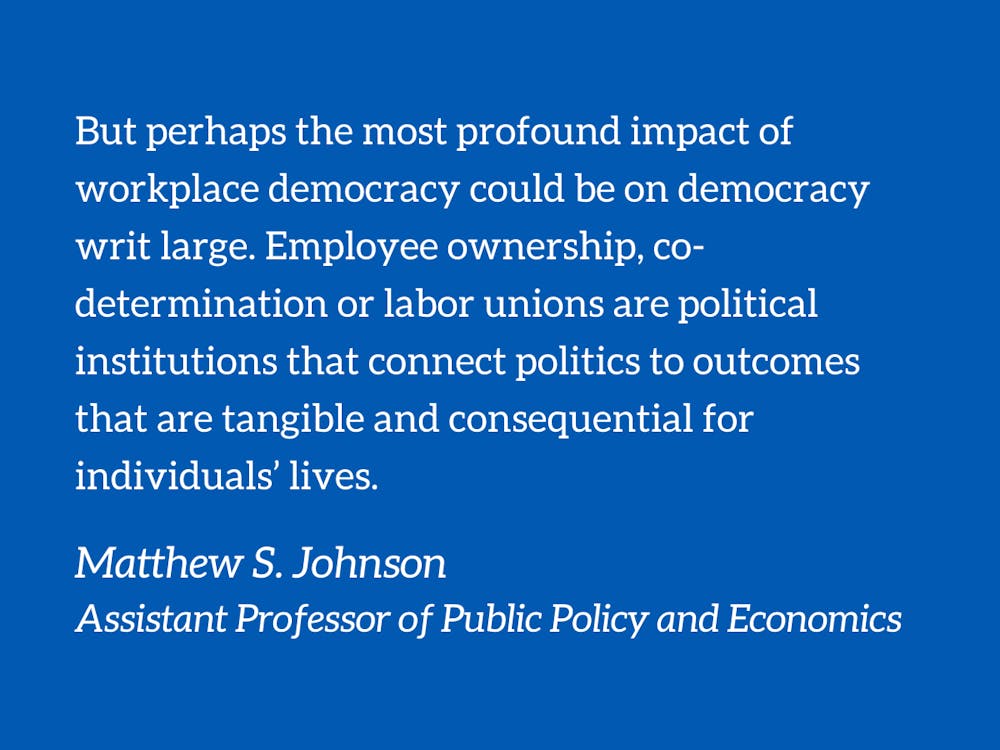I first learned of King Arthur Baking Company during the height of the COVID-19 pandemic, when I joined the bandwagon and began baking my own bread. What initially drew me to the company were its recipes for delicious sourdough waffles and its flour’s high protein content. What kept me fixated on the company, though, was its corporate structure.
King Arthur is 100% owned by its employees through an Employee Stock Ownership Plan (ESOP). Workers begin earning stock in the company once they’ve worked there for a year, providing both a nest egg for retirement and a direct interest in the company’s financial success. Moreover, workers — as co-owners — are directly engaged in the company’s decision-making.
ESOPs are a particular form of workplace democracy, or the "application of democratic practices, such as voting, debate and participatory decision-making systems, to the workplace." Other forms include worker co-operatives, in which workers both own and fully control the company, and co-determination, in which control of the firm is split between shareholders and workers. Labor unions — while they do not give workers direct control or authority in decision-making — are a more indirect form, providing worker voice via collective bargaining with employers over wages and working conditions.
If you’ve had an internship or any work experience during your time as a student, you have probably figured out that most U.S. workplaces are not bastions of democracy. Most workers in the U.S. and around the world exclusively earn an hourly wage or annual salary with little to no direct stake or say in what happens in their workplace. Production in most firms is organized through dictatorial control rather than democratic decision-making. Most of us have had little to no experience with democratic practices at work.
Why should we care about this seemingly arcane aspect of corporate governance? For workers, studies overwhelmingly show that workplace democracy brings substantial benefits. Workers who begin their careers as "employee-owners" accrue more wealth than their counterparts at traditional firms. Unions raise wages. Giving workers a "seat at the table" can ensure that companies’ decisions prioritize workers’ wellbeing, such as firing fewer workers during recessions. When Brock Barton, the current Chief Financial Officer of King Arthur, visited my class at the Sanford School in 2022, he described "brainfood classes" the company holds to increase workers’ financial literacy. This initiative wasn’t from the goodness of the management team’s hearts: it benefits the company to have owners who can read its balance sheet.
What about effects on the rest of the economy? By construction, employee-owned firms are not owned by outside shareholders exclusively focused on maximizing profits. King Arthur’s co-CEO put it clearly when he said "[w]e do not believe in growth for growth’s sake." That said, there are lots of evidence that workplace democracy tends to increase firm productivity. Though perhaps surprising, the economics of this relationship is clear: having a direct stake in the company’s success gives employees a clear incentive to work hard. Adam Smith himself argued that the separation of ownership and control — endemic in shareholder-owned firms — inevitably results in "negligence and profusion."
But perhaps the most profound impact of workplace democracy could be on democracy writ large. Employee ownership, co-determination or labor unions are political institutions that connect politics to outcomes that are tangible and consequential for individuals' lives. Experiencing democracy and its benefits at a micro scale provides a direct case for why democratic vitality is important at any scale, in the process promoting collectivity and a sense of common purpose. It is thus not surprising that exposure to participatory workplace practices leads individuals to be more critical of authoritarian government, and that coordinated policy efforts to weaken labor unions have led to quantifiable democratic backsliding.
Despite these potential benefits to workers, consumers and citizens, workplace democracy really only exists on the fringes of the U.S. economy. About 8 percent of U.S. workers work in an ESOP; the share in worker co-operatives is much smaller, and co-determination is non-existent. Fewer than 10% of U.S. workers today are members of a labor union. On the face of it, one might wonder if workplace democracy has a place in today’s U.S. capitalist system.
However, the present moment is a uniquely opportune one for workplace democracy. Americans overwhelmingly want democracy in their workplaces. The ongoing "silver tsunami" of baby boomers exiting the labor force means that millions of small business owners are retiring, many of which would be ripe for a transition to employee ownership. Americans’ approval of unions is at a near-record high, and the last two years have witnessed the biggest surge in union organizing in decades.
For those of us concerned about the health and future of democracy in the U.S., maybe the first place we should look for inspiration is inside our own workplaces.
Matthew Johnson is an Assistant Professor of Public Policy and Economics at the Sanford School of Public Policy. This piece is part of the “Virtues of Democracy” column, a series of op-eds by faculty and student contributors across Trinity College and the Sanford School of Public Policy. The column typically runs on Tuesdays or Thursdays.
Get The Chronicle straight to your inbox
Sign up for our weekly newsletter. Cancel at any time.

